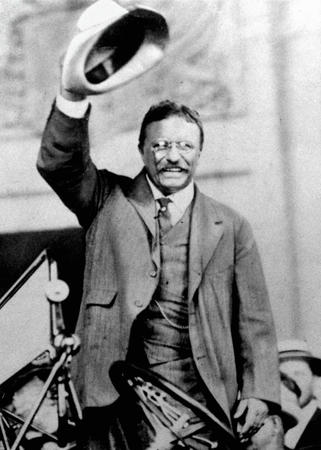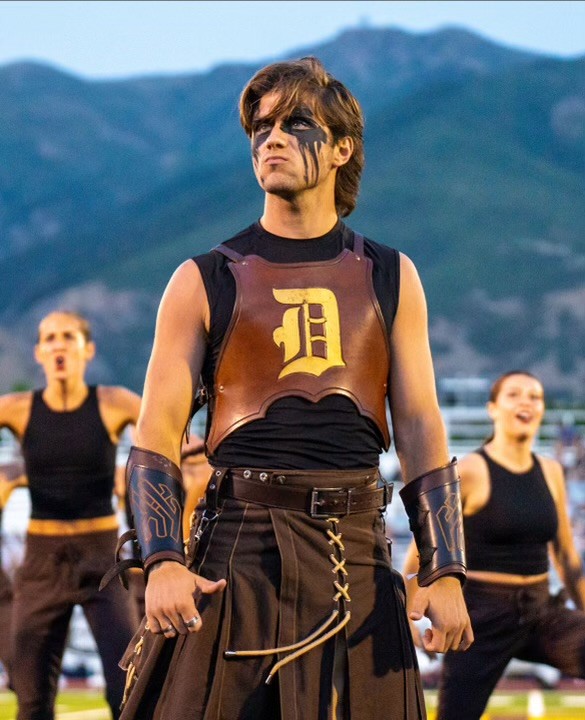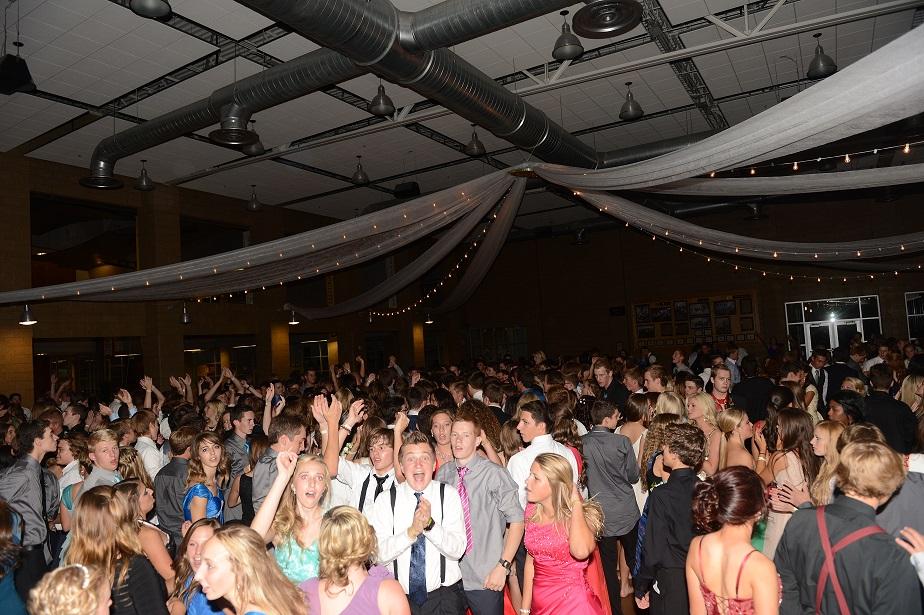Why Theodore Roosevelt should be your favorite president

Serving from 1901-1909, President Theodore Roosevelt is considered by most historians to be the “first modern president“, chiefly because he grew the power and influence of the presidency by taking advantage of all powers not denied to him by the Constitution. He shifted American politics out of an age of rigidly limited government and individualism and promoted using government regulation to bring about social and economic change. He brought America into the global age with an aggressive foreign policy. He was also widely beloved as president, aided by the fact he was the first to use the media to regularly charismatically communicate directly with the people.And not only was he a great politician he was an all around awesome guy. He was a war hero, and environmentalist, a boxer, cattle rancher, deputy sheriff, historian, naturalist, explorer, author of 35 books, police commissioner, assistant Secretary of the Navy, and lawyer.
Teddy Roosevelt’s time in the Armed Forces is highlighted by his famous Spanish-American War assault on Kettle and San Juan Hills in the Battle of San Juan Heights. One lesser known tidbit is that he achieved fame by resigning from his position in the Navy to start the First U.S. Cavalry Regiment, a.k.a. the ‘Rough Riders’. Because of his bravery and efforts, he was awarded the nation’s highest honor for military service, the Congressional Medal of Honor. And at the beginning of World War I Teddy Roosevelt, passionately wrote to Woodrow Wilson several times asking to be sent to France at the head of a 200,000 man expeditionary force. Wilson did not allow him to go. Because woodrow wilson is the worst.
At the beginning of his presidency America was under a time of monopolies and the free market going to far. His entire platform was based upon getting the people a fair deal. He believed that it was the responsibility of the government to protect the people under its jurisdiction, so his administration was dedicated to crushing the corrupt practices of monopolies, which had been allowed to operate entirely unregulated for decades. He helped create the Pure Food and Drug Act, cracked down on businesses who used misleading advertising, pushed for cooperation between business and unions, and became known as a ‘Trust Busting’ president, opening 40 antitrust cases against big corporations.
Teddies foreign policy was to “speak softly and carry a big stick,” and he believed that a chief executive must be willing to use force when necessary while practicing the art of persuasion. He sought to assemble a powerful and reliable defense for the United States in order to avoid conflicts with enemies who might prey on weakness. Roosevelt followed McKinley in ending the relative isolationism that had dominated the country since the mid-1800s, acting aggressively in foreign affairs, often without the support or consent of Congress. The most spectacular of Roosevelt’s foreign policy initiatives was the building of the Panama Canal. For years, the U.S. navy had dreamed of building a passage between the Atlantic and Pacific oceans through Central America. During the war with Spanish-American war, American ships in the Pacific had to steam around the tip of South America in two-month voyages to join the U.S. fleet off the coast of Cuba. In 1901, the United States negotiated with Britain for the support of an American controlled canal that would be constructed either in Nicaragua or through a strip of land in Panama owned by Colombia. Because of the more aggressive foreign policy path that President Roosevelt forged, he believed that the United States needed to beef up its defense. He started with the navy, transforming it into an impressive, modern fleet. He also ordered that each ship be painted completely white. Upon its completion, President Roosevelt ordered the ‘Great White Fleet‘ as it became known, to tour the world, demonstrating American naval might. And thus, Roosevelt built his own big stick. And To balance his aggressive foreign policy legacy, President Roosevelt also won a Nobel Peace Prize in 1906 for negotiating the Treaty of Portsmouth, which ended the Russo-Japanese War. At the time, he was the first American to have received the nobel peace prize.
Teddy was also ahead of his time in the means of social policy, he cared a great deal more for doing what was right than doing what was popular. As president, he was in favor of desegregation and the women’s right to vote. Most notably, Roosevelt was the first president to invite an African-American, Booker T. Washington, to the White House as a guest. He also appointed several people of color to federal positions
He was one of the most powerful voices in the history of American conservation. Enthralled by nature from a young age, Roosevelt cherished our country’s landscapes and wildlife. After becoming president in 1901, Roosevelt used his authority to establish 150 national forests, 51 federal bird reserves, four national game preserves, five national parks and 18 national monuments on over 230 million acres of public land. Today, the legacy of Theodore Roosevelt is found across the country. There are six national park sites dedicated, in part or whole, to our conservationist president. Roosevelt’s words and actions continue to affect how we approach and appreciate the natural world. In a Speech he gave in Osawatomie, Kansas, on August 31, 1910. He said
“There is a delight in the hardy life of the open. There are no words that can tell the hidden spirit of the wilderness that can reveal its mystery, its melancholy and its charm. The nation behaves well if it treats the natural resources as assets which it must turn over to the next generation increased and not impaired in value.”
He was also known by his incredible ability to survive assassination attempts. While he was campaigning for a third term in office, he was going to give a speech in Milwaukie, but he was shot before he could start . But the bullet did not stop him. He then said
“Friends, I shall ask you to be as quiet as possible. I don’t know whether you fully understand that I have just been shot; but it takes more than that to kill a Bull Moose. But fortunately I had my manuscript, so you see I was going to make a long speech, and there is a bullet — there is where the bullet went through — and it probably saved me from it going into my heart. The bullet is in me now, so that I cannot make a very long speech, but I will try my best.”
Then, in what is probably one of the most remarkable feats of public speaking in history, he arrived at the auditorium and completed an 84 minute speech. He also knocked out a would be assassin with two punches after he drew not one, but two guns on him.
He also had a great boxing career. He boxed for Harvard University’s intramural lightweight championship and continued to spar recreationally during his political career. During his days in the White House, he regularly put up his dukes against former professional boxers and other sparring partners until a punch from a young artillery officer smashed a blood vessel and left him nearly blind in his left eye. Roosevelt also had a great appreciation for wrestling. As David Shoemaker noted in The Squared Circle, Roosevelt was quoted as saying, “If I wasn’t president of the United States, I would like to be George Hackenschmidt.” Hackenschmidt was a broad-chested strongman from the Russian Empire who defeated Tom Jenkins in 1905 and became pro wrestling’s first recognized world heavyweight champion. His career in athletics is also incredibly impressive because of the health that he was born with. A sickly child, “Teedie”, as he was called by his family, was often unable to participate in many childhood activities that are usually taken for granted like playing outside and going to school. Teddy suffered from headaches, toothaches, and abdominal pain as well as debilitating asthma. Doctors didn’t understand the disease very well at the time, and Teddy was prescribed such remedies as going on vacation to the coast, smoking cigars, and drinking coffee and whiskey. He tried all of these remedies, but (not surprisingly) they did not cure his condition. Confined indoors, Teddy kept himself busy. In addition to being privately tutored until he entered college, Teddy began to write down his experiences, thoughts, and feelings in a journal. This practice persisted throughout his life. He also became a voracious reader. On the few occasions he was able to venture outdoors, he collected plants and animals to study. During this period, Teddy became extremely close to his father, Theodore Sr., who would stay awake with him during nights of sickness and who would take him on nighttime carriage rides to distract his son from his illness. Theodore Sr. imparted a strong moral conscience into his son. When Teddy was twelve years old, his father lectured him on the importance of developing the body in order to completely develop the mind. Teddy took this advice to heart and his father built him a home gym. He lifted weights, did gymnastics, and also rode horseback, swam, hiked, wrestled, boxed, and learned judo. Eventually, as his body became strong, his asthma disappeared.























